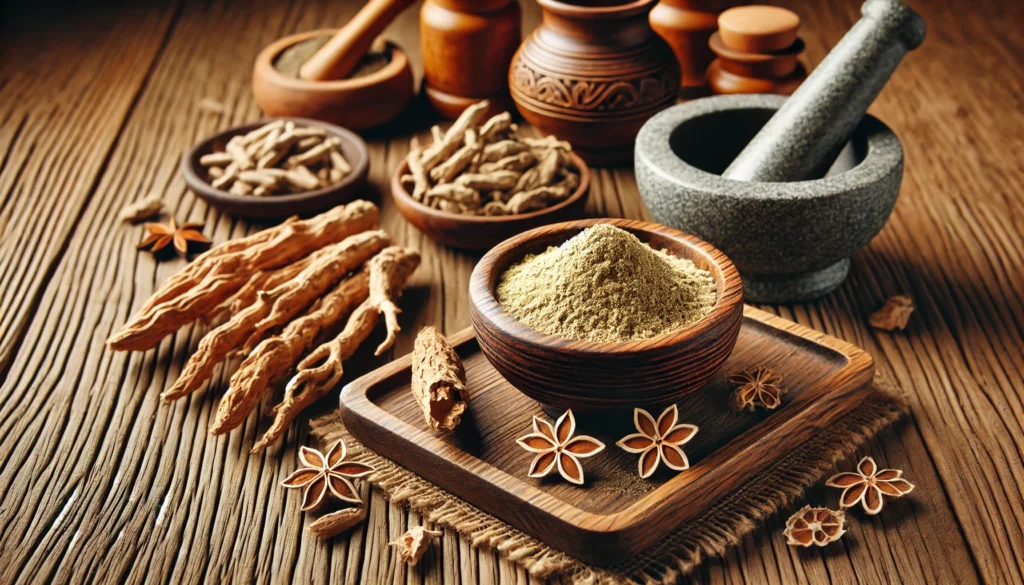Ashwagandha, scientifically known as Withania somnifera, is an ancient medicinal herb with a rich history rooted in Ayurvedic medicine. This revered herb has been used for centuries, celebrated for its ability to promote balance and resilience in the body. But what makes ashwagandha so unique among herbal remedies?
Historical Significance and Cultural Roots
Ashwagandha has been an integral part of Ayurvedic practices for over 3,000 years. Historically, it was used to rejuvenate the body and mind, offering vitality and longevity. Its name, which translates to “smell of the horse,” hints at its traditional use to impart strength and vitality akin to a stallion. This cultural heritage underscores its longstanding value in holistic health.
Adaptogenic Properties: What Makes It Stand Out
As an adaptogen, ashwagandha helps the body adapt to stressors, promoting homeostasis. Unlike stimulants or sedatives, adaptogens work subtly, supporting the body’s natural processes. This unique property makes ashwagandha a popular choice for those seeking a natural way to cope with modern stressors, offering a gentle yet effective approach to stress management.
Consumption Forms: Powder, Capsules, and More
Ashwagandha is available in various forms, each offering distinct advantages. Ashwagandha powder, for example, can be easily mixed into drinks or foods, while capsules provide a convenient, mess-free option. Gummies have recently gained popularity, especially among those who prefer a palatable, easy-to-consume form. Each type has different absorption rates, influencing how quickly and efficiently it works in the body.
You may also like: Exploring Magnesium and B12 for Anxiety Relief

Ashwagandha’s Active Compounds
The primary active compounds in ashwagandha are withanolides, which are believed to contribute to its health-promoting properties. These compounds have garnered interest for their potential to interact with various physiological systems, producing effects that can last for differing durations depending on several factors.
The Role of Withanolides
Withanolides are a group of naturally occurring steroids that give ashwagandha its adaptogenic qualities. These compounds are thought to modulate stress responses, support immune function, and promote cognitive health. Their presence in ashwagandha is a key reason for its wide-ranging benefits, making the herb a versatile addition to health regimens.
Additional Beneficial Compounds
Apart from withanolides, ashwagandha contains other bioactive substances such as alkaloids and saponins. These compounds contribute to the herb’s calming effects and may support anti-inflammatory responses in the body. Together, these compounds create a synergistic effect, enhancing ashwagandha’s overall efficacy.
Variability in Compound Concentration
The concentration of active compounds can vary significantly between different ashwagandha products. Factors like growing conditions, harvesting methods, and processing techniques all influence the potency of the final product. Understanding these variables is crucial for selecting high-quality ashwagandha that offers consistent benefits.
How Long Does Ashwagandha Stay in Your Body?
The duration of ashwagandha’s activity in the body can vary based on several factors, including the form of ashwagandha consumed, the dosage, and individual metabolic differences. Understanding these factors can help tailor ashwagandha use for optimal results.
Forms and Dosage: A Deeper Look
Ashwagandha Powder: Quick Absorption
Typically, 750 mg of ashwagandha powder is a common dosage. Its effects might be felt sooner due to its quick absorption but may dissipate faster compared to other forms. The powder’s rapid onset makes it suitable for situations where immediate stress relief is desired, yet its shorter duration may require more frequent dosing.
Ashwagandha Gummies: Convenience and Absorption
Gummies offer a tasty, convenient way to consume ashwagandha, but they often contain additional ingredients that might influence absorption rates. When considering how many ashwagandha gummies to take daily, it’s vital to adhere to the manufacturer’s recommended dosage. This ensures that you’re getting an effective amount while minimizing potential side effects.
Sensoril Ashwagandha: Potency and Duration
Sensoril is known for its potent, standardized extract, offering benefits such as stress reduction and enhanced cognitive function. The dosage of Sensoril ashwagandha can affect how long the benefits last, typically ranging from a few hours to a full day. Its standardized nature ensures a consistent concentration of active compounds, providing reliable results.
Metabolism and Individual Variability
The Impact of Metabolic Rates
Individual metabolic rates significantly influence how long ashwagandha remains active. Faster metabolisms may process and eliminate the herb more quickly, while slower metabolisms may extend its duration of action. This variability highlights the importance of personalized dosing strategies.
Factors Influencing Metabolism
Factors such as age, weight, genetic predispositions, and overall health can modify how the body processes and retains ashwagandha’s active components. For example, younger individuals with higher metabolic rates may experience shorter durations of effect, while older adults may find that the herb remains active longer.
Tailoring Ashwagandha Use
Given the variability in metabolism, it’s essential to tailor ashwagandha use to individual needs. Starting with a lower dose and gradually increasing it while monitoring effects can help determine the most effective and safe regimen. Consulting with a healthcare provider can offer additional guidance for personalized use.
Ashwagandha Benefits for Women and Men
The benefits of ashwagandha are well-documented across genders, with specific advantages for women and men. These benefits highlight the herb’s versatility and wide-ranging applications in promoting health and well-being.
Ashwagandha Root Benefits for Females
Hormonal Balance and Reproductive Health
For women, ashwagandha is celebrated for its potential to balance hormones and support reproductive health. It may aid in regulating menstrual cycles, alleviating symptoms of menopause, and improving fertility. These benefits make it a valuable tool for women navigating hormonal changes throughout their lives.
Mood Stability and Stress Reduction
Ashwagandha may help improve mood stability by reducing stress and anxiety levels. Its adaptogenic properties support the body’s stress response, leading to a calmer, more balanced emotional state. This makes it particularly beneficial for women experiencing mood swings related to hormonal fluctuations.
Enhancing Physical Vitality
In addition to its hormonal benefits, ashwagandha may enhance physical vitality and energy levels. This can be particularly beneficial for women juggling multiple responsibilities, providing a natural boost to overcome fatigue and improve overall quality of life.
Ashwagandha Benefits for Men
Boosting Testosterone and Muscle Strength
Men often turn to ashwagandha for its potential to boost testosterone levels and improve muscle strength. It may enhance physical performance and support muscle recovery, making it a popular supplement among athletes and fitness enthusiasts.
Supporting Mental Health and Cognitive Function
Ashwagandha’s benefits extend to mental health, with potential improvements in cognitive function and stress management. This makes it a versatile supplement for male wellness, aiding in the pursuit of mental clarity and resilience in the face of stress.
Enhancing Sexual Health
Ashwagandha may also support male sexual health by improving libido and sexual function. Its stress-reducing properties contribute to a healthier sexual experience, making it a holistic choice for enhancing intimacy and connection.

Safety Considerations: Taking Ashwagandha While Pregnant
One common inquiry is whether it is safe to take ashwagandha while pregnant or during breastfeeding. Safety considerations are paramount, given the limited research on ashwagandha’s effects during these critical periods.
Is Ashwagandha Safe During Pregnancy?
Current Research and Recommendations
Current research suggests that taking ashwagandha while pregnant should be approached with caution. There is limited scientific evidence on the effects of ashwagandha during pregnancy, and some sources advise against its use due to potential risks. Pregnant women should consult with their healthcare provider before considering ashwagandha supplementation.
Potential Risks and Concerns
Potential risks associated with ashwagandha use during pregnancy include its potential to affect hormone levels and fetal development. Given these concerns, erring on the side of caution is recommended until more robust research is available.
Alternative Stress-Relief Strategies
For pregnant women seeking natural stress relief, alternative strategies such as prenatal yoga, meditation, and dietary adjustments may offer safer options. These practices can provide relaxation and stress reduction without the potential risks associated with herbal supplements.
Why is Ashwagandha Bad for Breastfeeding?
Limited Research on Breastfeeding
Breastfeeding mothers are generally advised to avoid ashwagandha due to the lack of well-studied effects on milk production and infant health. The herb’s impact on lactation and potential transfer to breast milk remains unclear, warranting caution.
Potential Effects on Infants
Concerns about ashwagandha’s effects on infants stem from its potential to alter hormone levels and immune responses. Until more research is conducted, avoiding ashwagandha during breastfeeding ensures the safety of both mother and child.
Consulting Healthcare Providers
Breastfeeding mothers considering ashwagandha or any supplement should consult their healthcare provider. Professional guidance can help weigh the potential benefits and risks, ensuring informed decisions about maternal and infant health.
Ashwagandha for Teenagers and Teens
The use of ashwagandha for teenagers raises questions about dosage and safety. While ashwagandha can support stress management and cognitive function, consulting with a healthcare provider is essential to ensure appropriate use for this age group.
Benefits for Adolescent Development
Ashwagandha may offer benefits for teenagers undergoing developmental changes, including stress reduction and improved focus. Its adaptogenic properties can help adolescents manage academic pressures and social challenges, promoting overall well-being during a critical growth period.
Dosage Considerations for Teens
Determining the appropriate dosage for teenagers requires careful consideration of age, weight, and individual health needs. Starting with a lower dose and adjusting based on response can help ensure safe and effective use. Healthcare providers can offer personalized recommendations tailored to adolescent health.
Ensuring Safe Use
Safety is paramount when considering supplements for teenagers. Parents and guardians should ensure that teens use ashwagandha under the supervision of a healthcare provider. This oversight helps prevent potential interactions with medications and ensures that the supplement supports healthy development.

Conclusion: How to Optimize Ashwagandha Use
To maximize the benefits of ashwagandha, consider the following:
Consultation with Healthcare Professionals
Always consult with a healthcare professional before starting any supplement regimen, especially if you have pre-existing health conditions or are pregnant. Professional guidance ensures that ashwagandha use aligns with your health needs and goals.
Adhering to Recommended Dosages
Adhere to recommended dosages and be mindful of the form of ashwagandha you choose, as this can influence absorption and efficacy. Following dosage guidelines minimizes the risk of side effects and enhances the herb’s benefits.
Consistency and Monitoring Effects
Regular use of ashwagandha may enhance its cumulative benefits, but be aware of potential long-term effects and adjust usage accordingly. Monitoring your response to the herb can help fine-tune your regimen for optimal results.
In sum, ashwagandha can be a valuable addition to a wellness routine, offering numerous benefits for stress management and overall health. Understanding how long it stays active in your body and its potential implications for different demographics ensures you can harness its full potential safely and effectively.
Further Reading:
Benefits of Ashwagandha and How Much to Take
Ashwagandha Dosage: How Much Should You Take per Day?
Important Note: The information contained in this article is for general informational purposes only, and should not be construed as health or medical advice, nor is it intended to diagnose, prevent, treat, or cure any disease or health condition. Before embarking on any diet, fitness regimen, or program of nutritional supplementation, it is advisable to consult your healthcare professional in order to determine its safety and probable efficacy in terms of your individual state of health.
Regarding Nutritional Supplements Or Other Non-Prescription Health Products: If any nutritional supplements or other non-prescription health products are mentioned in the foregoing article, any claims or statements made about them have not been evaluated by the U.S. Food and Drug Administration, and such nutritional supplements or other health products are not intended to diagnose, treat, cure, or prevent any disease.


